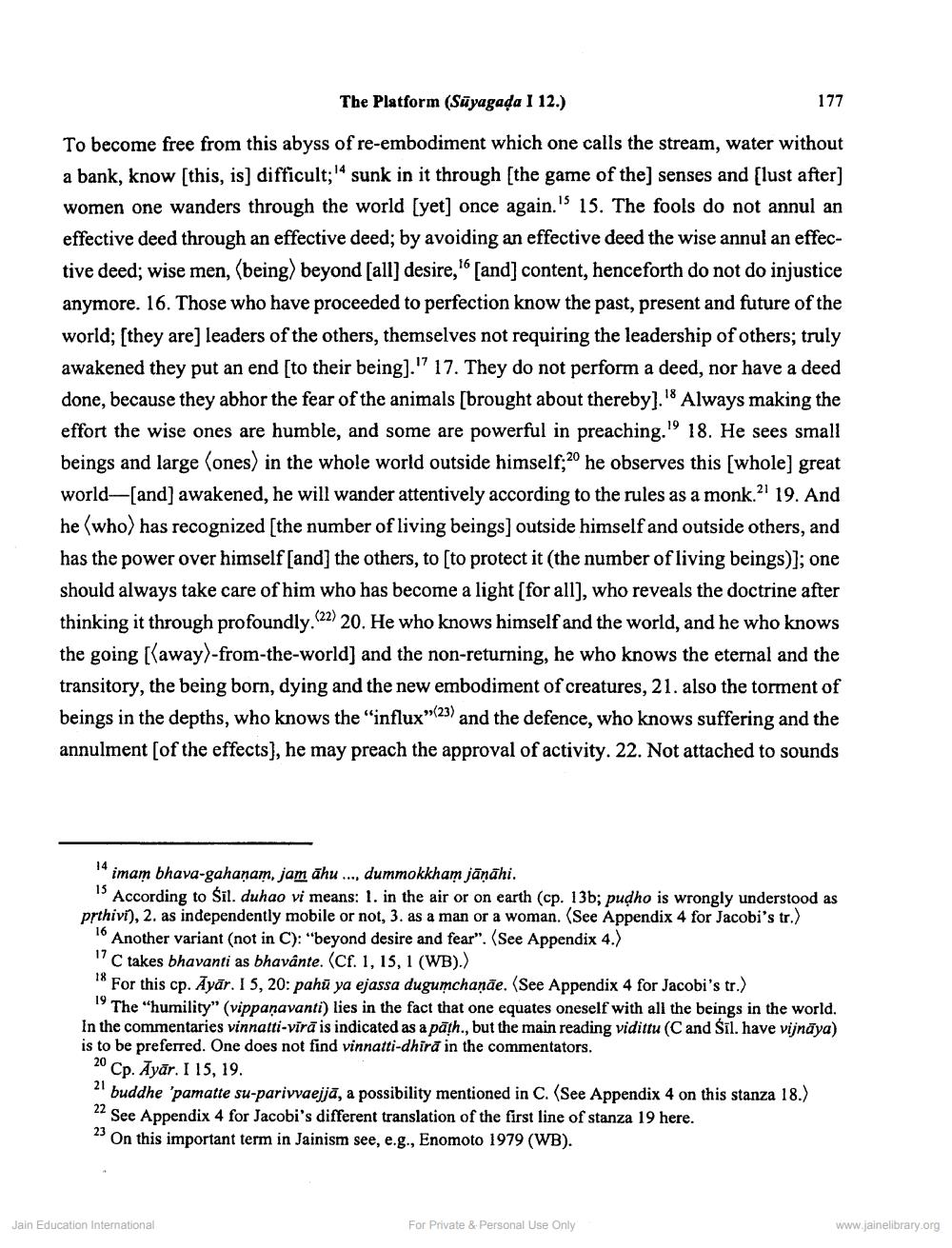________________
The Platform (Süyagada I 12.)
177
To become free from this abyss of re-embodiment which one calls the stream, water without a bank, know [this, is) difficult;!4 sunk in it through (the game of the) senses and [lust after) women one wanders through the world (yet) once again." 15. The fools do not annul an effective deed through an effective deed; by avoiding an effective deed the wise annul an effective deed; wise men, (being) beyond (all) desire, [and] content, henceforth do not do injustice anymore. 16. Those who have proceeded to perfection know the past, present and future of the world; (they are) leaders of the others, themselves not requiring the leadership of others; truly awakened they put an end [to their being]." 17. They do not perform a deed, nor have a deed done, because they abhor the fear of the animals [brought about thereby].' Always making the effort the wise ones are humble, and some are powerful in preaching. 18. He sees small beings and large ones) in the whole world outside himself;20 he observes this [whole) great world-[and] awakened, he will wander attentively according to the rules as a monk.2' 19. And he who) has recognized [the number of living beings] outside himself and outside others, and has the power over himself [and] the others, to (to protect it (the number of living beings)]; one should always take care of him who has become a light (for all], who reveals the doctrine after thinking it through profoundly. (22) 20. He who knows himself and the world, and he who knows the going [(away)-from-the-world) and the non-returning, he who knows the eternal and the transitory, the being born, dying and the new embodiment of creatures, 21. also the torment of beings in the depths, who knows the "influx”(23) and the defence, who knows suffering and the annulment [of the effects), he may preach the approval of activity. 22. Not attached to sounds
imam bhava-gahanam, jam āhu..., dummokkham jāņāhi. 15 According to Sil. duhao vi means: 1. in the air or on earth (cp. 13b; pudho is wrongly understood as prthivi), 2. as independently mobile or not, 3. as a man or a woman. (See Appendix 4 for Jacobi's tr.)
10 Another variant (not in C): "beyond desire and fear". (See Appendix 4.) " takes bhavanti as bhavante. (Cf. 1, 15, 1 (WB).) ** For this cp. Āyār. I 5, 20: pahū ya ejassa dugumchaņãe. (See Appendix 4 for Jacobi's tr.)
"The "humility" (vippaņavanti) lies in the fact that one equates oneself with all the beings in the world. In the commentaries vinnatti-vīrā is indicated as a pāh., but the main reading vidittu (C and Sil. have vijnāya) is to be preferred. One does not find vinnatti-dhira in the commentators.
20 Cp. Ayār. I 15, 19. - buddhe 'pamatte su-parivvaejjā, a possibility mentioned in C. (See Appendix 4 on this stanza 18.) - See Appendix 4 for Jacobi's different translation of the first line of stanza 19 here. 23 On this important term in Jainism see, e.g., Enomoto 1979 (WB).
Jain Education International
For Private & Personal Use Only
www.jainelibrary.org




